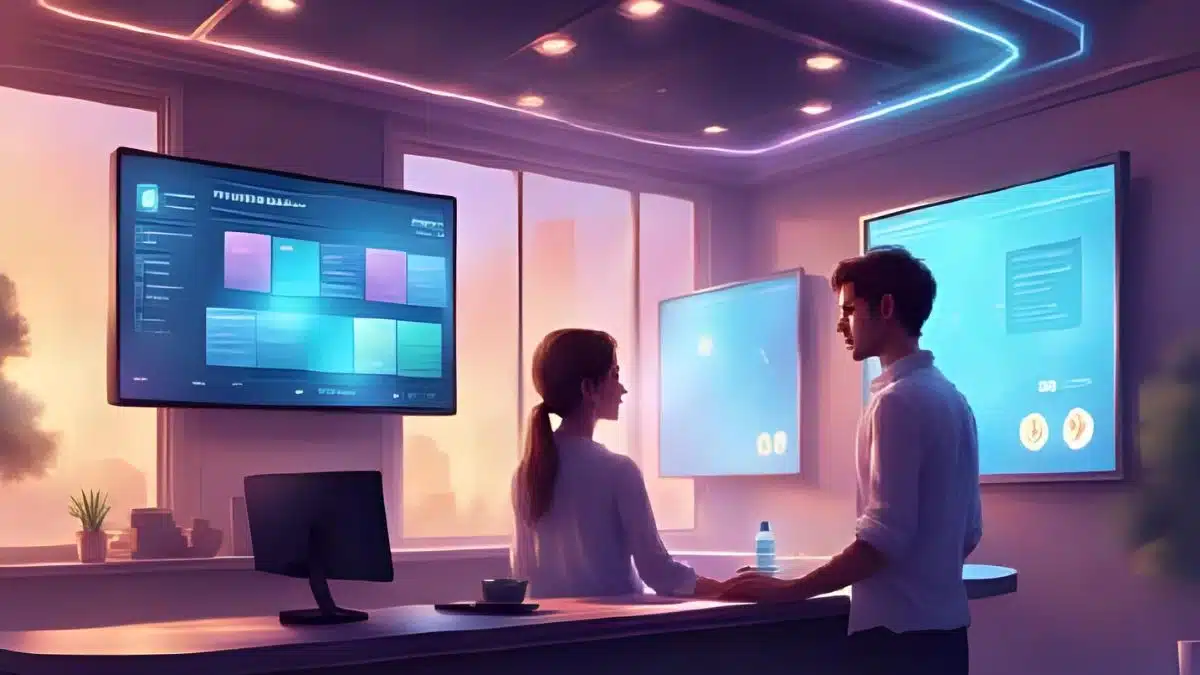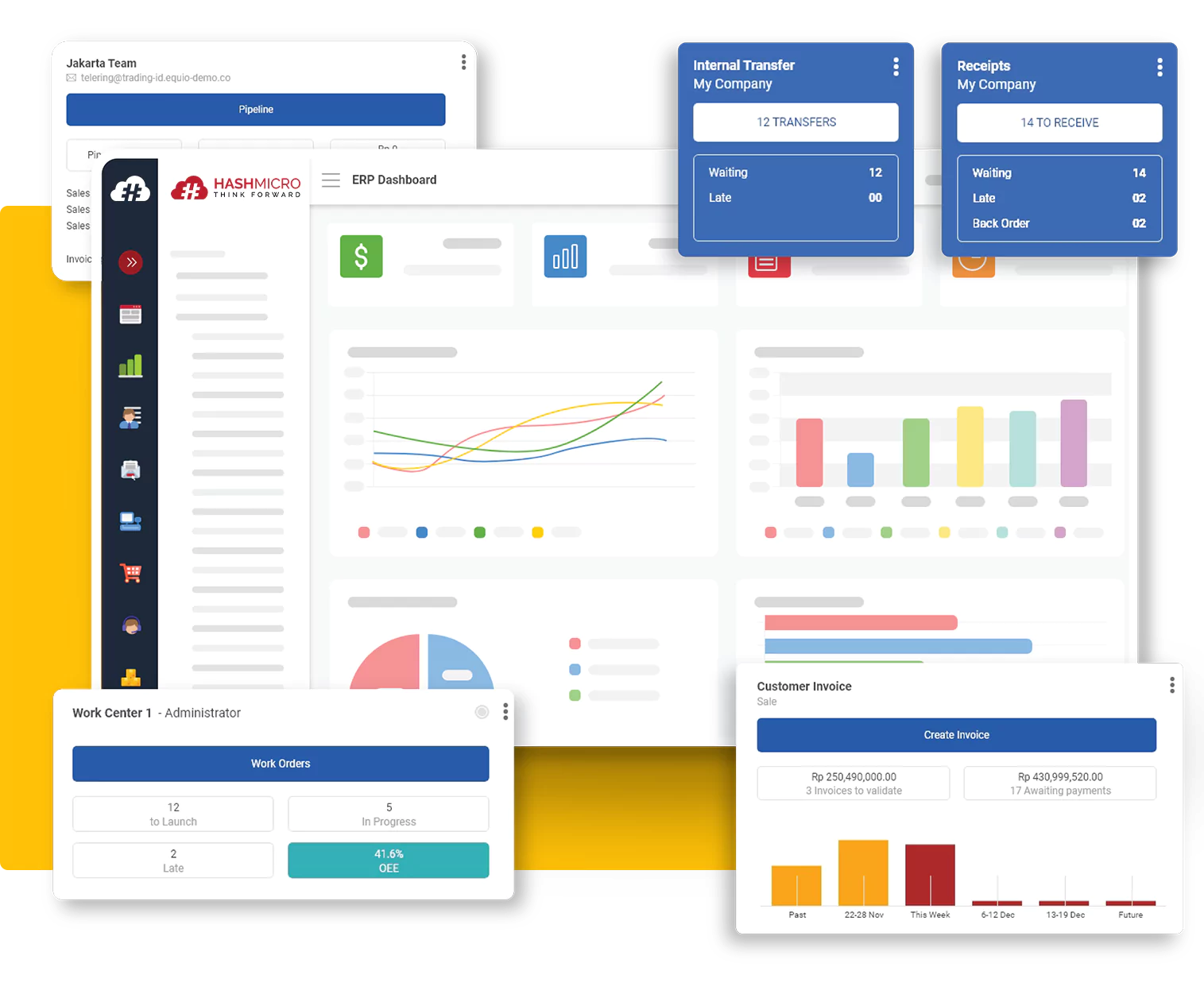Have you ever heard about ERP Hospitality software? Formerly, ERP software was primarily used by the manufacturing industry, e-commerce businesses, or distribution companies. Now, you can use ERP software for the hospitality industry as well.
Working in hospitality taught me that success isn’t just about good service, it’s about creating lasting guest experiences. Managing that consistently, however, can be tough. That’s where ERP Hospitality software steps in.
With the ERP system, all departments, from reservations to housekeeping, are connected in one single platform. It automates tasks, reduces human errors, and helps your team focus on improving resource management and delivering exceptional service every time.
Key Takeaways
|
What is Hospitality ERP?
Hospitality ERP is a centralized software system designed to integrate and manage various operations within the hospitality industry. It connects key departments like reservations, finance, housekeeping, inventory, and customer service.
The primary purpose of a Hospitality ERP system is to improve efficiency, accuracy, and guest satisfaction. ERP helps businesses automate manual tasks, make data-driven decisions, and deliver exceptional service experiences to their guests.
Why Does Hospitality Need ERP?

Running a hospitality business requires constant coordination across multiple areas like reservations, staffing, and customer service. Without seamless communication between departments and well-managed resources, these operations can quickly become chaotic.
ERP systems consolidate all these functions under one platform, enabling businesses to manage everything from bookings to finances in real-time. For hospitality operators, this integration translates to smoother workflows, improved efficiency, and enhanced guest experiences.
Beyond operations, ERP systems with built-in CRM tools enable the creation of more personalized guest experiences. By tracking customer preferences and visit history, businesses can offer tailored services, fostering loyalty and repeat visits.
14 Benefits by Implementing Hospitality ERP for Your Business
1. Improve customer service
As we agreed, the hospitality industry sells experience to the customer, starting with customer service. Then, what is the correlation between ERP software and customer service? ERP software can help customer service to customize what the customer wants based on their previous visit.
It makes customer service jobs more manageable when they wish to offer any services that are likely to match customers’ desires. All of these functions can increase customers’ loyalty and bring profit to the industry.
Also read : Different ERP Software Systems Catering Different Businesses
2. Centralized management system
You may have more than one business in the hospitality industry, it can be a hotel, restaurant, spa, or massage place.
It can be challenging to check the management of all businesses you have, but no more worries; with the ERP software system, you can check all of the companies you run because the ERP software will centralize all the managing tasks on one big data.
3. Help you build online presence
When you use ERP Hospitality software, you can also make your reservation feature easier. You can build your website with chatbots to interact with your customers when they want to make a reservation.
Not only that, if your customers had their best time in your hospitality business, they can leave a good review on your web so that your web can appear on the first page of any search engine.
4. Implement an effective revenue management system
Many hospitality industries have management systems to set prices and other features to maximize their income. That means you don’t have to change your price list drastically depending on the season, and you can set your price list using ERP software.
The right software ERP system should be able to connect to a channel manager; why so? Because you may promote your property in the hospitality sector on many channels or even third-party booking services.
ERP Hospitality software could integrate all the data to control and monitor all the reservations and inform you what kind of advertisement works to increase your hospitality business’ income.
Also read: 5 Benefits of CRM System for Hotels That You Must Know
5. Increase bookings
If you want to increase your property bookings, first ensure that your hotel management system is working properly. Revenue management and direct booking features will help you achieve this, which is why it is essential to ensure all systems are functioning as they should.
ERP hospitality software will ease this job for you. The software itself, even can integrate all the data, avoids double bookings, and makes reports for you, and even the ERP hospitality software can automate all of it.
6. Reduce technology overhead
When you adopt ERP hospitality software to your system, the system will automatically make an accounting and employee performance report by itself. With this, you can have an easier way to identify and solve the problem effectively.
Also Read: Best ERP Software Recommendations – Explore the best software options available this year and find the right fit for your business needs.
7. Increased efficiency
We’ve all experienced the frustration of poor service at a hotel or restaurant, delayed check-ins, lost bookings, or slow responses that make guests vow never to return. In the hospitality industry, such inefficiencies can lead to significant financial loss.
ERP systems act as a central hub connecting reservations, staffing, inventory, and finances, ensuring real-time updates and seamless coordination. When every process runs smoothly, errors decrease, productivity increases, and guest satisfaction rises.
8. Data management and accuracy
Hospitality operations generate massive amounts of data, from reservations and guest details to inventory and staff schedules. Managing all that information manually can lead to costly mistakes like overbookings or stock shortages.
ERP systems solve this by serving as a unified data hub that synchronizes and cleans information across multiple platforms. By integrating with reservation and CRM systems, ERP ensures real-time updates to room availability and guest profiles.
9. Enhanced security and compliance
The hospitality industry handles vast amounts of sensitive data, making compliance with strict regulations like GDPR and payment security standards essential. ERP systems strengthen data protection through advanced security tools.
Role-based access ensures only authorized staff can view or modify confidential data, while cloud-based ERP platforms automatically update compliance protocols and generate audit trails. This minimizes the risk of data breaches, helps avoid penalties.
10. Mobile and remote management
Hospitality managers often oversee multiple sites and need to make quick decisions wherever they are. Modern ERP systems enable this flexibility by providing mobile access to real-time data and management tools.
Through their devices, managers can track room availability, monitor inventory, and approve orders instantly, ensuring smooth operations and swift responses to on-site issues. This mobility enhances communication and prevents delays.
11. Customer relationship management integration
Customer satisfaction drives the hospitality industry, and integrating ERP with CRM systems makes it easier to deliver personalized, seamless experiences. This integration connects operational and guest data, allowing automated updates to reservations, inventory, and service preferences.
As a result, hotels and restaurants can anticipate guest needs, streamline workflows, and build stronger customer loyalty through consistently exceptional service.
12. Sustainability practices
Sustainability has become a crucial focus in hospitality, where energy use, waste, and resource inefficiency can drive up costs and harm brand reputation. ERP systems help tackle these challenges by tracking energy consumption.
With better visibility into resource use, hospitality businesses can lower expenses, meet environmental standards, and strengthen their image as responsible, eco-conscious brands.
13. Scalability
Scaling hospitality operations is complex due to fluctuating demand, multi-location management, and the integration of new services. ERP systems simplify this process with flexible, modular designs and centralized data that support smooth expansion.
Whether opening new branches or adding services, businesses can maintain consistent operations and service quality while adapting quickly to changing demands.
14. Value-enriched reports
Data-driven insights are essential for hospitality success, yet managing multiple data sources often complicates reporting. ERP systems solve this by unifying data from finance, HR, CRM, and inventory into a single, real-time source of truth.
With customizable reports, managers can quickly analyze occupancy trends, revenue patterns, and guest behavior, empowering smarter decisions and targeted strategies that enhance both efficiency and customer satisfaction.
Here is a table summary that discussed about 14 benefits by implementing hospitality ERP for your business
| Kelebihan | Kekurangan |
| Improve customer service | ERP software personalizes services based on previous guest interactions, helping staff meet customer preferences, boost loyalty, and increase revenue. |
| Centralized management system | Manage multiple properties or business units from a single platform, with ERP centralizing operations, data, and reporting for easier oversight. |
| Help you build online presence | ERP hospitality software helps you create a user-friendly website with features like chatbots for reservations and encourages guest reviews, boosting search engine visibility. |
| Implement an effective revenue management system | Set dynamic pricing and connect your ERP to a channel manager to manage rates across multiple booking platforms, optimize reservations, and track advertising effectiveness. |
| Increase bookings | Integrated ERP systems prevent double bookings, streamline direct reservations, and automate reporting, helping maximize occupancy and revenue. |
| Reduce technology overhead | ERP software automates accounting, reporting, and performance tracking, simplifying management and enabling faster problem-solving. |
| Increased efficiency | ERP systems streamline hospitality operations by connecting reservations, staffing, inventory, and finances, reducing errors, boosting productivity, and improving guest satisfaction. |
| Data management and accuracy | By centralizing and synchronizing data across platforms, ERP ensures accurate real-time updates for reservations, inventory, and guest profiles, preventing costly mistakes. |
| Enhanced security and compliance | Advanced ERP security features like role-based access, encryption, and automated compliance tracking protect sensitive data and help meet regulations such as GDPR. |
| Mobile and remote management | ERP systems provide managers with real-time access on mobile devices, enabling quick decision-making, and seamless operations across multiple locations. |
| Customer relationship management integration | Integrating ERP with CRM allows seamless updates to reservations, inventory, and guest preferences, helping hotels and restaurants personalize services and build loyalty. |
| Sustainability practices | ERP systems track energy use and resource consumption, helping hospitality businesses reduce costs, meet environmental standards, and enhance their eco-friendly reputation. |
| Scalability | Flexible, modular ERP systems support expansion across locations and services while maintaining operational consistency and adapting to fluctuating demand |
| Value-enriched reports | Unified ERP data provides real-time insights from finance, HR, CRM, and inventory, enabling managers to make informed decisions and optimize guest experiences. |
Streamline Your Hospitality Operations with HashMicro’s Hospitality Software

HashMicro’s Hospitality Software provides an all-in-one solution designed to simplify and automate complex hospitality operations. From managing reservations and guest data to optimizing inventory and finances, this system ensures smooth coordination across departments.
The software offers high flexibility, allowing hotels, resorts, and restaurants to tailor workflows that fit their operational structure. Its advanced, customizable features empower businesses to build more efficient reporting and management systems.
Here are some of the standout features of HashMicro’s Hospitality Software:
- Automated Reservation Management: Streamlines room or table booking, minimizes double bookings, and enhances the guest experience.
- Integrated Accounting System: Synchronizes financial data in real time for accurate and quick decision-making.
- Inventory Optimization: Ensures stock levels are maintained according to seasonal demand to reduce waste.
- AI-Powered Insights: Analyzes operational data, detects anomalies, and suggests corrective actions automatically.
- Real-Time Performance Reports: Provides instant insights into occupancy, revenue, and service quality to support data-driven decisions.
Conclusion
ERP Hospitality Software plays a crucial role in ensuring operational efficiency and accuracy in the hospitality industry, especially in overcoming challenges related to managing reservations, inventory, and guest services.
HashMicro ERP Hospitality Software offers a modern solution that integrates all operational processes, ranging from guest management and housekeeping to accounting and inventor, into one unified platform.
If you want to see how this ERP system can streamline your operations and elevate service quality, schedule a free demo today and discover how HashMicro can be the perfect solution for your hotel, restaurant, or resort.

Frequently Asked Questions
-
What is a Hospitality ERP System?
A Hospitality ERP System is an integrated software solution that helps hotels, resorts, and restaurants manage various operations—such as reservations, billing, inventory, HR, and customer service—within one centralized platform.
-
How can ERP benefit the hospitality industry?
ERP systems streamline operations, reduce manual tasks, and provide real-time insights into performance metrics. This leads to improved efficiency, better resource management, and enhanced guest satisfaction through faster, more personalized service.
-
Is a Hospitality ERP suitable for small businesses?
Yes. Modern ERP systems, like HashMicro ERP, are scalable and customizable, making them ideal for both small and large hospitality businesses. They can be tailored to specific needs and budgets while supporting future growth.

































